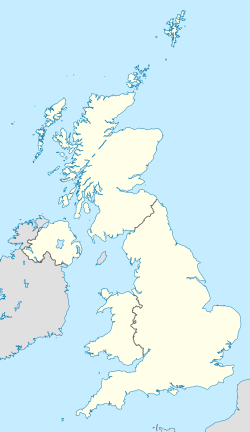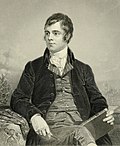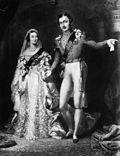Portal:United Kingdom
The United Kingdom Portal
 |
 |

| |
The United Kingdom of Great Britain and Northern Ireland, commonly known as the United Kingdom (UK) or Britain, is a country in Northwestern Europe, off the coast of the continental mainland. It comprises England, Scotland, Wales, and Northern Ireland. The UK includes the island of Great Britain, the north-eastern part of the island of Ireland, and most of the smaller islands within the British Isles, covering 94,354 square miles (244,376 km2). Northern Ireland shares a land border with the Republic of Ireland; otherwise, the United Kingdom is surrounded by the Atlantic Ocean, the North Sea, the English Channel, the Celtic Sea, and the Irish Sea. The UK maintains sovereignty over the British Overseas Territories, which are located across various oceans and seas globally. The United Kingdom had an estimated population of over 68.2 million people in 2023. The capital and largest city of both England and the United Kingdom is London. The cities of Edinburgh, Cardiff, and Belfast are the national capitals of Scotland, Wales, and Northern Ireland, respectively.
The UK has been inhabited continuously since the Neolithic. In AD 43, the Roman conquest of Britain began; the Roman departure was followed by Anglo-Saxon settlement. In 1066, the Normans conquered England. With the end of the Wars of the Roses, the English state stabilised and began to grow in power, resulting by the 16th century in the annexation of Wales, and the establishment of the British Empire. Over the course of the 17th century, the role of the British monarchy was reduced, particularly as a result of the English Civil War. In 1707, the Kingdom of England and the Kingdom of Scotland united under the Treaty of Union to create the Kingdom of Great Britain. In the Georgian era, the office of prime minister became established. The Acts of Union 1800 incorporated the Kingdom of Ireland to create the United Kingdom of Great Britain and Ireland in 1801. Most of Ireland seceded from the UK in 1922 as the Irish Free State, and the Royal and Parliamentary Titles Act 1927 created the present United Kingdom.
The UK became the first industrialised country and was the world's foremost power for the majority of the 19th and early 20th centuries, particularly during the Pax Britannica between 1815 and 1914. The British Empire was the leading economic power for most of the 19th century, a position supported by its agricultural prosperity, its role as a dominant trading nation, a massive industrial capacity, significant technological achievements, and the rise of 19th-century London as the world's principal financial centre. At its height in the 1920s, the British Empire encompassed almost a quarter of the world's landmass and population, and was the largest empire in history. However, its involvement in the First World War and the Second World War damaged Britain's economic power and a global wave of decolonisation led to the independence of most British colonies. (Full article...)
Featured article
Royal Maundy is a religious service in the Church of England held on Maundy Thursday, the day before Good Friday. At the service, the British Monarch or a royal official ceremoniously distributes small silver coins known as "Maundy money" as symbolic alms to elderly recipients. The name "Maundy" and the ceremony itself derive from an instruction, or mandatum, of Jesus at the Last Supper that his followers should love one another. In the Middle Ages, English monarchs washed the feet of beggars in imitation of Jesus, and presented gifts and money to the poor. Over time, additional money was substituted for the clothing and other items that had once been distributed; the custom of washing the feet did not survive the 18th century. Today, Queen Elizabeth II (pictured at the 2005 service) almost always attends, and the service is held in a different church (usually a cathedral) every year. Maundy money is struck in denominations of one penny, two pence, three pence, and four pence. In most years there are fewer than 2,000 complete sets; they are highly sought after by collectors. (Full article...)
Featured biography
Anne of Denmark (1574–1619) was queen consort of Scotland, England, and Ireland as the wife of King James VI and I. The second daughter of King Frederick II of Denmark, Anne married James in 1589 at the age of fourteen and bore him three children who survived infancy, including the future Charles I. She demonstrated an independent streak and a willingness to use factional Scottish politics in her conflicts with James over the custody of Prince Henry and his treatment of her friend Beatrix Ruthven. Anne appears to have loved James at first, but the couple gradually drifted and eventually lived apart, though mutual respect and a degree of affection survived. In England, Anne shifted her energies from factional politics to patronage of the arts and constructed a magnificent court of her own, hosting one of the richest cultural salons in Europe. After 1612, she suffered sustained bouts of ill health and gradually withdrew from the centre of court life. Though she was reported to have died a Protestant, evidence suggests that she may have converted to Catholicism at some stage in her life. Historians have traditionally dismissed Anne as a lightweight queen, frivolous and self-indulgent. However, recent reappraisals acknowledge Anne's assertive independence and, in particular, her dynamic significance as a patron of the arts during the Jacobean age. (Full article...)
General images -
Subportals
WikiProjects
Things you can do
- Visit the British Wikipedians' notice board.
- The noticeboard is the central forum for information and discussion on editing related to the United Kingdom.
- Comment at the British deletion sorting page.
- This page lists deletion discussions on topics relating to the United Kingdom.
Featured pictures
Did you know -

- ... that the 37-metre-long (121 ft) Burnham Pier is sometimes described as the United Kingdom's shortest?
- ... that a £142 wine fridge was smuggled into Downing Street on 11 December 2020, during the height of the COVID-19 lockdown in the United Kingdom?
- ... that by losing her constituency of South West Norfolk in 2024, Liz Truss became the first former UK prime minister since 1935 to lose their seat?
- ... that former Scottish Conservative leader Ruth Davidson said that she would swim in Loch Ness naked if the SNP won more than 50 seats at the 2019 United Kingdom general election?
- ... that when Westminster City Council in London agreed to use "global majority" as a more inclusive term than BAME or "ethnic minority", a Conservative MP called it "deeply sinister"?
- ... that "one of the finest cut brick façades" in the United Kingdom has been partially obscured by scaffolding for four years, as funds are raised for its repair?
In the news
- 14 April 2025 – Russian invasion of Ukraine
- United Kingdom and the Russian invasion of Ukraine
- The United Kingdom sends £752 million ($990 million) to Ukraine for the purchase of surface-to-air missiles, artillery and spare parts for fighter aircraft, as part of an international loan programme funded primarily through seized Russian financial assets. (Reuters)
- 14 April 2025 – July Revolution
- A court in Dhaka, Bangladesh, along with the Anti-Corruption Commission, issues an arrest warrant for Tulip Siddiq, a United Kingdom MP who is the niece of ousted former leader Sheikh Hasina, for corruption allegations. Siddiq has rebuked the arrest warrant and called it a "smear campaign" against her. (DW) (BBC News)
- 12 April 2025 – Steel Industry (Special Measures) Act 2025
- The British government passes emergency legislation to control some management decisions at British Steel in order to prevent the closure of the Jingye Group-owned Scunthorpe Steelworks. (BBC News)
- 10 April 2025 –
- The United Kingdom's Cabinet Office announces it will cut around 2,100 jobs from its department, about a third of its total workforce, as part of wider government spending cuts. (BBC News)
- 9 April 2025 –
- Universal Destinations & Experiences formally announces that they have chosen a site near Kempston Hardwick in Bedfordshire, England, as the location for their Universal Studios United Kingdom resort. The theme park will officially open in 2031 and will be the largest theme park in the UK upon completion. (AP)
Categories
Other UK-connected Wikipedias
Wikimedia
The following Wikimedia Foundation sister projects provide more on this subject:
-
Commons
Free media repository -
Wikibooks
Free textbooks and manuals -
Wikidata
Free knowledge base -
Wikinews
Free-content news -
Wikiquote
Collection of quotations -
Wikisource
Free-content library -
Wikiversity
Free learning tools -
Wikivoyage
Free travel guide -
Wiktionary
Dictionary and thesaurus



























































































![Image 8 George IV Artist: Sir Thomas Lawrence An oil on canvas portrait of George IV of the United Kingdom as the Prince Regent, by Sir Thomas Lawrence. In 1814, Lord Stewart, who had been appointed ambassador in Vienna and was a previous client of Thomas Lawrence, wanted to commission a portrait by him of the Prince Regent. He arranged that Lawrence should be presented to the Prince Regent at a levée. Soon after, the Prince visited Lawrence at his studio in Russell Square. Lawrence wrote to his brother that: To crown this honour, [he] engag'd to sit to me at one today and after a successful sitting of two hours, has just left me and comes again tomorrow and the next day. More featured pictures](http://upload.wikimedia.org/wikipedia/commons/thumb/9/9f/George_IV_bust1.jpg/120px-George_IV_bust1.jpg)



























